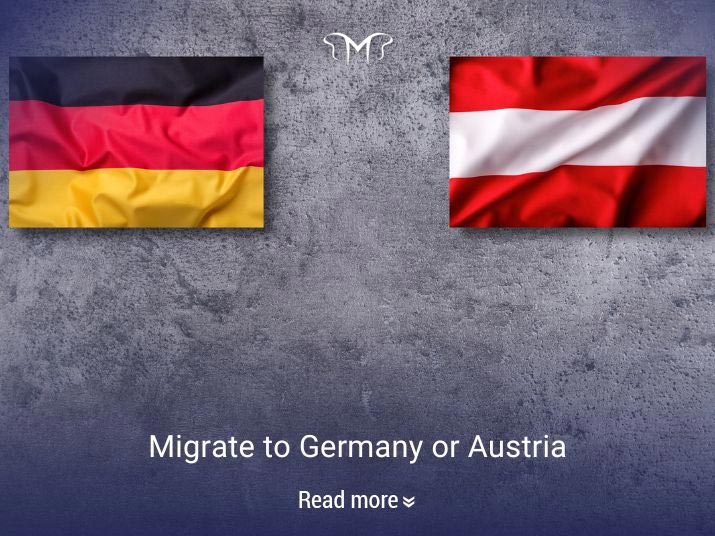
Individuals Looking to Migrate to Germany or Austria
People who intend to migrate to Germany or Austria seek a reliable and accurate indicator for migration between the two countries. Austria and Germany are neighboring, German-speaking countries located in Central Europe. These two countries have many similarities and differences. Germany, due to having the largest economy in the world, offers numerous job opportunities in all fields, along with abundant healthcare and welfare facilities, making it an attractive destination for many skilled workers, including nurses. On the other hand, Austria, with its top universities, opportunities for work while studying, appealing architecture, abundant job opportunities, and welfare facilities for skilled migrants, has become a popular migration destination for many individuals. In this article from the Monarch Immigration Institute, we aim to compare migration to Austria versus Germany. Therefore, if you are considering migrating to either Austria or Germany, stay with us until the end of this article.
Conditions and Process for Obtaining a Visa to Migrate to Germany or Austria
Before discussing other factors for comparing migration to Austria or Germany, let’s review the first and most important step for entering and migrating to either country.
Necessary Documents and Conditions for an Austrian Visa
To compare obtaining a visa and migrating to Germany or Austria, it should be noted that the Austrian visa is one of the most popular, attractive, and well-regarded visas for educational, work, and tourist migration among European countries. A country known for its art, historical sites, music, philosophy, and numerous tourist attractions, Austria has stricter conditions compared to the German visa and those of other European countries. The Austrian visa is divided into three types: student, work, and tourist visas, which are issued based on the applicant's purpose. Additionally, the conditions and processes for obtaining each of these three visas do not differ significantly.
Austrian Tourist Visa
This type of visa is issued for individuals intending to travel and visit the country. To travel to Austria, you must have a Schengen visa. With this visa, you can stay in the country for up to 90 days within a 6-month period.
Austrian Work Visa
To obtain this type of visa, you must receive a legal invitation from an Austrian employer.
Austrian Student Visa
To obtain a student visa for Austria, you must receive an invitation from one of the universities or colleges in the country. This involves sending your resume and academic documents to the desired university. The professors and officials at the destination university will review your resume, and upon approval, they will send you an invitation to study in Austria. After this, you can submit the necessary documents to the embassy to obtain your student visa.
Required Documents for Obtaining an Austrian Visa
As mentioned, there are various types of visas for migrating to Austria or Germany, each with different conditions and documents. However, the most important documents required for obtaining an Austrian visa are as follows:
-
Visa application form
-
Identification document
-
Valid passport (the passport must be valid for at least 6 months beyond the requested visa expiration date)
-
Copies of pages 1 to 5 of the passport, as well as pages with visa stamps
-
Three recent color photographs
-
Official employment and financial documents
-
For housewives who are dependents: employment certificate and bank statement
-
Proof of enrollment for students
-
A translated property ownership document
-
Travel insurance
-
Round-trip flight ticket or confirmed reservation to Austria
-
Paid hotel invoice, if necessary
It's important to note that all documents in Persian must be officially translated into English and bear the Ministry of Foreign Affairs stamp and approval from the judiciary.

Conditions Required for Obtaining an Austrian Visa
Travel History: Providing a travel history is crucial for obtaining a visa and migrating to Austria or Germany, especially for those with a tourist visa. A travel history demonstrates to the visa officers that you are a tourist and have visited other countries before traveling to Austria. It also confirms that you will return to your home country after your trip.
Bank Statements: Presenting bank statements is mandatory for migrating to Austria or Germany. This refers not to the amounts that come in or out of the account, but rather the number of transactions over the last six months. The purpose of providing bank statements is to review the applicant's financial dealings.
Financial Stability: Financial stability is one of the fundamental requirements for obtaining a visa to migrate to Austria or Germany. The ideal financial stability for an Austrian visa is around 300 to 350 million IRR per person. It’s important to note that if a large sum suddenly appears in your account, you must provide documentation of the transaction to the embassy.
Employment and Social Insurance Letter: This letter serves to assure the destination country that the applicant will return to their home country after the visa expires.
Invitation Letter: An invitation letter increases your chances of migrating to Germany or Austria. This letter can come from a friend, family member, a recognized university or college, or even an employer or company.
Conditions for German Visa
Germany is one of the most significant countries in Europe and has attracted many immigrants in recent years, with nurses being one of the most important groups. Many individuals dream of working, studying, and migrating to this country, but specific conditions must be met to turn this dream into reality. There are three types of visas for migrating to Germany: student, work, and tourist visas, with conditions for these visas being quite similar to those for Austria. The general conditions for a German visa are as follows:
Financial Stability: Financial stability is one of the most important requirements for obtaining a visa and migrating to Germany or Austria. Financial stability must be documented in euros and must bear the stamp and signature of the issuing branch.
Bank Statements: Bank statements are another essential requirement for migrating to Austria or Germany. This refers to the applicant's transactions over the past three months. There must be consistency and alignment between the bank statements and the financial stability letter; otherwise, your visa may be rejected.
Strong Invitation Letter: A strong invitation letter is one issued by a university, employer, family member, or a reputable company. The letter must include the applicant's personal information, duration, and place of residence.
Travel History: For obtaining a German visa, there is no need to provide a travel history. However, having a valid visa such as a Schengen visa in your passport significantly increases your chances of obtaining a visa.
Documents Required for Obtaining a German Visa
-
Passport along with all previous visas and passports
-
Receipt for visa fee payment
-
Marriage certificate for married individuals
-
All property documents
-
Employment verification letter
-
Student enrollment verification for current students
-
Bank statements for the last three months along with financial stability documentation
Migration to Austria or Germany: Living Costs Comparison
Germany and Austria offer unique experiences due to their rich culture and history. Generally, Germany is more affordable, with diverse cities, while Vienna is known for its high living costs. On average, monthly expenses are around 1,584 euros for a single person and about 4,400 euros for a family of four in Austria. Rent in major cities like Vienna can reach 800 to 1,200 euros for a one-bedroom apartment. In contrast, Berlin and Munich offer lower rents and cheaper food due to lower VAT.

Advantages of Living in Austria and Germany
Both countries boast high quality of life, excellent public transport, robust healthcare, and strong educational systems. They also provide safety, historical attractions, and opportunities for global travel.
Read more: Best Cities in the World for Quality of Life
Comparison of Entertainment Options
Germany features vibrant entertainment options, including concerts and festivals, while Austria, with its stunning mountains and lakes, is perfect for winter sports enthusiasts. Vienna hosts various cultural and musical events.

Quality of Life
Both countries rank high in quality of life, but Germany stands out for its advanced infrastructure and job opportunities, especially in Frankfurt.
Conclusion
Migrate to Germany or Austria has increased significantly in recent years. If you're a healthcare professional considering this move, Monarch Immigration Agency can guide you through the process.
FAQs:
-
Which agencies assist nurses in migrating to Germany?
-
Monarch Immigration Agency is one of the best options for nurses.
-
What are the visa requirements for Austria or Germany?
-
Key requirements include financial stability, travel history, bank statements, and a strong invitation letter.
-
What is the financial requirement for migration?
-
Financial stability of 300 to 350 million IRR per person is needed.


